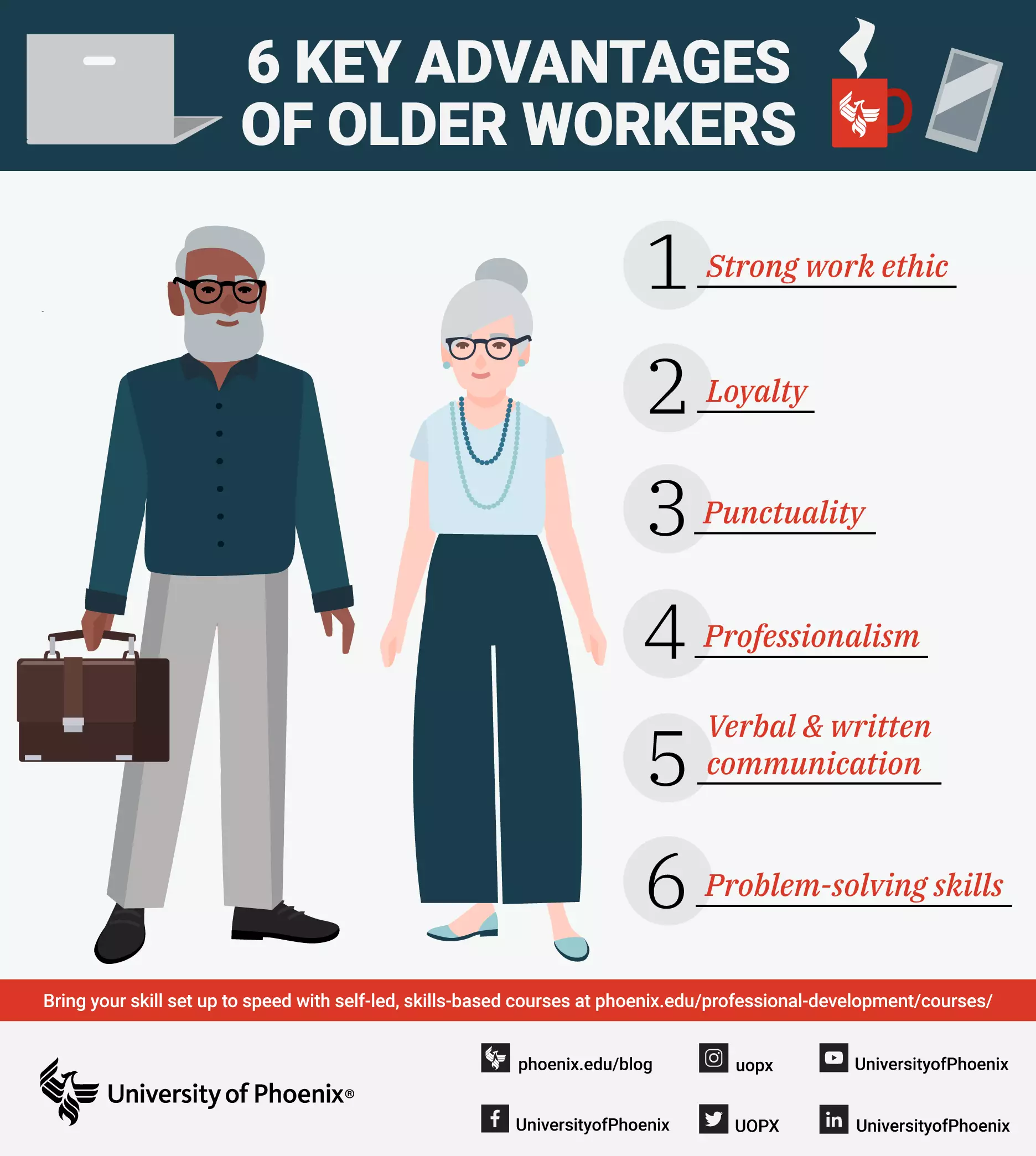Is ageism a thing?

Written by Elizabeth Exline

Reviewed by Jessica Roper, MBA, director of Career Services at University of Phoenix

When you embark on a career path, you’ll probably foresee certain challenges. Maybe you know that you’ll need a certain degree or that competition will be stiff for a certain role.
Other challenges are more subtle. They creep up on you when you think you’ve finally hit your stride and are on your way to job security.
Like what challenges? you ask. Like ageism—the sometimes overt but more often tacit sidelining of experienced workers that, despite legal protections, plagues the American workplace.
Alice Rush, a career advisor with University of Phoenix and a certified career counselor with 30 years of experience in private practice, has seen ageism more than once during her career.
She explains: “In the ’90s, there was a switch from going for the gold watch like my dad did in corporate America … [to] outsourcing, downsizing, right-sizing and moving jobs overseas. … Unfortunately, what we saw in corporate America was the most expensive people, the older people, were the ones who were laid off. That’s who I was left with coaching and [who asked], ‘How do we navigate our careers when we’re 40-, 50-plus?’”
Age, as it turns out, actually is more than just a number.
But while Rush acknowledges there are some “ugly truths” about age discrimination, she says there are also ways to circumvent them.
“We don’t have to lie down and say, ‘OK, well, I guess I should just give up,’” Rush contends. “It’s really important to take the blinders off and see, yes, there is age discrimination. But where is there not? Where can I use my age to my advantage?’”
The meaning of ageism
Age discrimination is exactly what it sounds like: using a person’s age as a basis for unfair treatment.
Or, as the U.S. Equal Employment Opportunity Commission puts it, ageism is “treating an employee or applicant less favorably because of his or her age.”
To counteract ageism in the workplace, the Age Discrimination Employment Act prohibits using age as a basis for hiring, assigning work, promoting employees or terminating employees. It protects anyone 40 or older — but just how effective it is as a law is up for debate.
What age discrimination looks like
As with most forms of discrimination, knowing ageism exists and is illegal is one thing. Recognizing and combating it is trickier. Age discrimination takes a lot of different forms, including (but not limited to):
- Job listings that use words like “energetic” when describing the ideal candidate
- Disparaging remarks by co-workers and management about your age, abilities or even retirement plans
- Learning and development opportunities made exclusively available to younger employees
“It’s a product of ignorance in many ways,” Rush explains.
The root of ageism
What’s so interesting about age discrimination, though, is that, according to Forbes.com, a recent study found those who most vociferously decry racism and sexism remain “prejudiced against older workers.” (And the younger the study’s participants were, the more prejudiced against older workers they were.)
There are theories for why this occurs. For starters, society at large condones ageism. You only have to look at advertising campaigns to see it. (Hello, age-defying everything.) Or, as the Forbes article notes, look as far as the birthday-card aisle, where being old is usually the punchline.
Then there’s the possibility that the generation that prides itself on not being racist or sexist harbors some prejudice against generations they perceive as upholding those very attitudes. “Culture changes faster than consciousness,” Rush notes.
Whatever the causes, the effects can be devastating. Feeling sidelined or excluded from the workplace can cause emotional distress, which Rush extrapolates to potential health problems down the road. Citing Maslow’s hierarchy of needs, Rush points out that, on the pyramid, a sense of belonging resides just above physical safety and biological needs like food and water.
“When we don’t feel that sense of belonging, we go down to survival mode, which isn’t a good place to be,” she says.
How to overcome ageism in the workplace
Unfortunately, ageism isn’t a rare occurrence. According to AARP, which cites data from the U.S. Bureau of Labor statistics, 64% of workers say they have seen or experienced age discrimination in the workplace.
“It doesn’t surprise me,” Rush says. “We can’t just think that, because age discrimination is illegal, it’s going away. [Instead] we need to go where we’re wanted and needed.”
Fighting ageist stereotypes
Ageism can occur at any stage of your career path, from the application process, when a company might institute a quota for recent college graduates (the implication being they can get newly educated talent at a relatively low price), right on through to near retirement when a company might unethically lay off an employee before he or she can claim a pension.
“I see this over and over again with my clients [who are] close to getting their pensions, and then they get fired,” Rush laments.
Among the many ageist stereotypes are the following:
- Older employees who aren’t digital natives can’t understand technology.
- Older employees lack physical fitness and stamina.
- Older employees should “step out of the way” of younger employees looking for opportunities.
While these attitudes are rooted in misconceptions and give rise to hurtful and damaging behaviors, Rush contends that empathy is the first necessary step toward combating age discrimination. Experienced candidates aren’t going to be a perfect fit for every role. That’s OK. Some companies can’t afford an experienced workforce, and some companies simply value different assets.
Be proactive as an older worker
But there are steps older workers can take to put their experience to good use. And that’s good news since 1 in 5 American workers is over 55.
These measures include:
- Stay sharp: Study job descriptions, Rush says. Pay attention to trends. And when you spot a vulnerability in your skill set, rectify it. Technology, for example, can be a pain point for older workers, but plenty of online courses are available that allow you to upskill quickly and economically.
- Diversify your income: Just as you wouldn’t invest all of your retirement savings in one company, don’t depend on your employer for a golden parachute. Instead, create multiple revenue streams with freelance projects and side work. And don’t forget to network for your next gig (or job)!
- Seek a mentor: “Look at where the older workers are in your organization,” Rush advises. The relationship can be informal, but observing how they move through the company and learning about opportunities from them can create a road map for your career.
- Become a mentor: Find ways to add value. Maybe you share your hard-earned wisdom with the up-and-coming generation of co-workers. Maybe you serve as an internal consultant for your company, lending your expertise to teams outside of your own. Or maybe you go outside your organization altogether to serve as a leader for a professional organization. The idea is to leverage your knowledge in ways that are both useful and visible.
The advantages of an older workforce
Another effective method for combating age discrimination is seeking out opportunities that cater to an experienced worker’s strengths. Those openings tend to be in knowledge-based fields, Rush says.
“If you were going to go into heart surgery, would you rather have someone who had gray hair or who was right out of college,” Rush asks.
Point taken.
Fields like healthcare, teaching, higher education and consulting are well suited to older workers who bring life and work experience to market.
There are, after all, plenty of employers who are buying what experienced workers have to offer. Some old-school skills that can be hard to come by in younger workers include:

“These old-fashioned skills of conflict resolution, collaboration, listening and communication, which just about every job is desperately seeking, that’s where we triumph as older workers,” Rush says.
And that may just be the most important thing to remember: Being older means you’re a little bit wiser. You have a perspective recent college graduates may not have — and everyone wins when you collaborate rather than compete.
“I say, ‘Why fight it?’” Rush concludes. “Go where you’re going to be welcomed.”

ABOUT THE AUTHOR
Elizabeth Exline has been telling stories ever since she won a writing contest in third grade. She's covered design and architecture, travel, lifestyle content and a host of other topics for national, regional, local and brand publications. Additionally, she's worked in content development for Marriott International and manuscript development for a variety of authors.

ABOUT THE REVIEWER
Jessica Roper, University of Phoenix director of Career Services, is a seasoned leader with over 15 years of experience in leadership within higher education. She has honed her expertise in student services and career development and is passionate about helping others discover and refine their skills.
This article has been vetted by University of Phoenix's editorial advisory committee.
Read more about our editorial process.
Read more articles like this:


